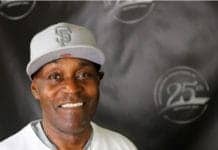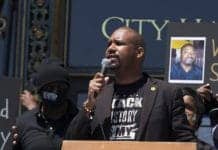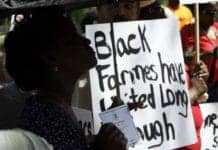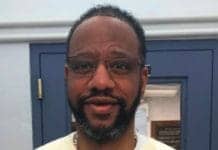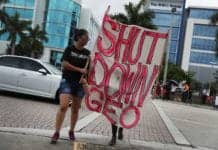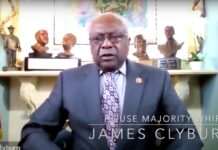‘Superheroes,’ which Donald Lacy calls ‘the most important play written in the last 25 years,’ was inspired by Gary Webb; it runs through Dec. 21 at the Cutting Ball Theater, 277 Taylor St., San Francisco
by Donald E. Lacy Jr.

I want to invite my community to come see the world premiere of a play I have the pleasure of acting in called “Superheroes.” The play is written and directed by one of our Bay Area artistic geniuses, Sean San Jose, and looks at the impact of the crack cocaine epidemic on Black and Brown communities.
The play is 10 years in the making and has been workshopped for the past four-five years. The cast is incredible, featuring Juan Amador, Myers Clark, Delina Patrice, Britney Frazier and Ricky Saenz. It is a powerful slice of life realism that will be presented at the Exit Theater, 277 Taylor St. in San Francisco, a few feet from Glide Memorial Church. This is a co-production between Campo Santo and Cutting Ball Theater.
The idea for the play was inspired by Sean being at a live broadcast of my Wake Up Everybody show from the Jahva House when I interviewed Gary Webb in front of a live studio audience. Wake Up Everybody is heard every Saturday morning, 7 a.m.-12 noon, on KPOO 89.5 FM and on the web at www.kpoo.com. The interview took place in June 2004.
For over a year we did my Wake Up Show at the Jahva House, thanks to D’Wayne Wiggins. I had read “Dark Alliance,” and I knew about the possibilities of the CIA and crack cocaine before the series came out. But “Dark Alliance” was the smoking gun that proved it. So here it is.
I am honored and thankful to the San Francisco Bay View for printing this 50-minute radio interview that I did with a true American hero, who sacrificed everything, including his life, to tell the truth. It is incumbent on us to hold the U.S. government accountable for the facts that Mr. Webb uncovered. I am honored to present to you The Great Gary Webb!
[soundcloud url=”https://api.soundcloud.com/tracks/179265171″ params=”auto_play=false&hide_related=false&show_comments=true&show_user=true&show_reposts=false&visual=true” width=”100%” height=”450″ iframe=”true” /]
Transcript
Donald Lacy: Broadcasting live from the Jahva House. Joining us now, ladies and gentlemen, it’s a pleasure to welcome to our microphone journalist Mr. Gary Webb. How are you, sir?
Gary Webb: I’m fine. How are you?
Donald Lacy: Good, good. We meet at last. We have been trying to get you – and first of all let me congratulate you for the series “Dark Alliance” that appeared in the San Jose Mercury; it was very thought-provoking, very pivotal journalism. First of all, how did the story come to you and subsequently make it to the paper?
Gary Webb: The story came to me in sort of in a roundabout way, which is usually the way stories come to reporters. I had been working on a series of articles about the drug war and looking specifically at the asset forfeiture laws, where they go in and take people’s houses away and take their cars away from them if they’re a drug dealer. And I had done a series on that for the Mercury and had gotten the law abolished.
And after that series came out, I had a call from a woman who lived here in Oakland, ironically, who said that her boyfriend had a similar situation. He was in jail and he had been in jail for three years and had never been brought to trial. All of his assets – all of his houses, all of his businesses – had been confiscated and she thought that it might make a good follow-up story to what I was working on.
And I said well, it might, but I had already done this story a lot of times and I didn’t see anything new in what she had to say. You know, it’s sad but it’s a fact of life in the drug wars. You know, you don’t have to be guilty to lose your property.
And then she said, “Well, there’s something about this story that I’m sure that you haven’t written about before,” and I said, “What’s that?” And she said, “One of the witnesses in this case used to work with the CIA, and he used to sell crack cocaine in Los Angeles.”
And I said: “Wait a minute. He used to work in the CIA and he sold drugs?” And she said, “Yeah,” and I said, “Do you have documents?” because I didn’t believe her, and she said, “Yeah, I can prove it.”
So I said, “Let me take a look at it.” So I go over to Oakland and I met her and she had a lot of documents. And I don’t know what the federal government was thinking to release these things to her.
But there were grand jury transcripts and FBI reports about this drug ring that existed here in the Bay Area and LA for about 10 years during the ‘80s and ‘90s and the grand jury testimony was that during the startup of this drug ring, they had been selling drugs to support the Contras, which was the Nicaraguan army the CIA was supporting in Central America.
Donald Lacy: During the Reagan administration?
Gary Webb: Yes, during the Reagan-Bush administration. And the thing that struck me about it was that this grand jury transcript was the testimony of somebody who had been a drug dealer for a long time.
Donald Lacy: This is Freeway Ricky?
Gary Webb: No, this is a guy named Danilo Blandon, who was a Nicaraguan who had come to the United States after the revolution in Nicaragua and had started selling drugs in LA. And at the point in time when he was testifying before the grand jury, he was now working for the government. And I thought, well, if the government is putting this guy on the stand and he’s saying this, they must believe it or they wouldn’t have him up there testifying.

So I went back to my editors, and I said I think we have an interesting story here. We have a federal witness – we’ve got a guy here who’s working for the federal government saying he sold drugs to support the Contras. I think this is a good story. And they agreed.
It had been something that had been sort of rumored during the ‘80s, but nobody ever nailed it down. So they turned me loose on it, which wasn’t unusual. I had been an investigative reporter at that point for 17 years, I’d won a lot of awards and I had written for the Mercury for nine years and they said, “If you see a story, go after it.” So I started working on it. It took me like a year to finish it up, but that’s how it got started.
Donald Lacy: So once you found this story or this story found you, what was Freeway Rickey’s involvement? Was he a distributor for Blandon?
Gary Webb: I didn’t know about Freeway Rick until about halfway through the story. I was concentrating on these Nicaraguans who were bringing cocaine into the country, and it turned out that Freeway Rick was their customer. I had some familiarity with Rick because when I was doing the asset forfeiture series, I had researched his case.
And I knew from reading the LA Times story that this guy was the biggest crack dealer in LA during the early ‘80s. And suddenly it occurred to me, well, if this was the biggest crack dealer during the ‘80s and he was buying his cocaine from the Nicaraguan Contras, there’s a bigger story here than I thought.
At that point I went back to my editors, and I said, “Look, I think this a pretty big story now, and I think we need to go to Nicaragua, I think we need to go to Central America and I think we need to go around the country to sort of tie up these loose ends and document this thing,” because from what I knew about Rick and from what I knew about the quantity of cocaine these Nicaraguans were bringing it into the country, this was a huge, huge drug ring that had a major impact on LA and had never been written about before.
Donald Lacy: So then when you went back to your editors and said we’ve got a bigger story here. We need to go around to these various places and tie up these loose ends and see how this whole puzzle fits together. Then what happened?
Gary Webb: Well, I ended up down in Nicaragua interviewing a drug kingpin named Norwin Meneses, who was the head of a drug operation. He had been living here in San Francisco for a long time and running a drug ring out of a couple of houses in the Mission district and in Pacifica. And he was in jail in Nicaragua at the time, and we set up an interview with him and we went to talk to him.
He basically admitted that, yeah, he had been working with the Contras, that this was part of an effort to fund the Contras because Congress had cut off money for supporting them. These men thought what they were doing was very patriotic, and frankly a lot of Americans thought the Contras were – well, Reagan described them as the moral equivalent of the founding fathers.
The idea that they were selling drugs was to them – you know, the end justifies the means – that old saying. And they were using cocaine to sell here in the United States and using the money to buy weapons for the Contras – trucks, uniforms and that sort of thing.



So once we sort of completed the circle – we had Blandon as the guy who was down in LA selling to Rick, and we had Meneses as the guy who was selling the drugs to Blandon and bringing them into the country. And then we started wondering how can a drug ring of this size operate for this long in the midst of the war on drugs without anybody ever busting them?
So that’s what we decided to do next is to try to find out how. What happened, we found out, is that they were being protected the whole time they were selling drugs – from the time these planes left Colombia until the time they arrived in San Francisco, it was a protected operation. The FBI knew about it, and they weren’t allowed to investigate it. The DEA knew about it. The specific agents found out about it. They weren’t allowed to investigate it, or their investigations were compromised.
The LA County Sheriff’s Department found out about it, and they actually tried to do something about it. And their investigation was blown, and the officers believed it was blown by the CIA, because at that point in time, if anybody had found out that the Contras were dealing coke, it would have been the end for the public support in the United States.
The thing to me that made this so outrageous was that once this cocaine came into the country, it didn’t just disappear, you know, and that’s sort of where the trail ended with these previous investigations. And we tracked it back down to the street and found out that Freeway Rick’s customers, the Crips and the Bloods, who were turning it into crack and selling it all through South Central and eventually through the United States.
So when we put all this stuff together, we did a story that said this was the first major drug pipeline into South Central, this was the drug ring that fed the crack epidemic and caused it to explode in South Central and that was the extent, in essence, of the three-day series we did for the Mercury.
Donald Lacy: And then from that South Central base, it spread up here and like an octopus antenna it spread all over the country.
Gary Webb: Ironically, it started here simultaneously – I mean here being Oakland and the Bay Area – simultaneously with it starting down in South Central, because half the Contra drug operation was based here in the Bay Area. When I went back and I dug out old police raid files, I found out they had safe houses here in Oakland for the people they were selling it to, and they were starting making inroads into the Black community up here at the same time they were making inroads down in South Central.
Donald Lacy: If you’re tuning in late, our guest once again Mr. Gary Webb, the author of the searing series of articles that appeared in the San Jose Mercury News, “Dark Alliance,” and we’re here of course discussing this crack cocaine epidemic.
Now, I want to get back to the complicity of the government and the CIA in particular. But it had to go further than the CIA – in other words, the CIA wasn’t just operating as some lone independent wing without the Reagan administration. And then what was Oliver North’s connection to this whole crack cocaine distribution and the Iran-Contra scandal?
Gary Webb: Well, first of all, the idea that the CIA is this rogue elephant agency that operates on its own is nonsense. They report directly to the president. And during these years, William Casey was the head of the CIA. He was Reagan’s former campaign manager; he was a friend of his. So Casey was basically the one who was in charge of this. Whether Reagan knew about it personally or not I’ve never been able to tell. But William Casey certainly knew about it.
And one of the things that came out after my series came out, thanks largely to Maxine Waters, was this document called the Memorandum of Understanding, which had been signed between the CIA and the Justice Department back in I believe it was 1981 or 1982, right when the covert operation in Nicaragua was starting. And what this memorandum said very simply, it made one little change to the intelligence laws of this country.
But what it said was if a CIA agent or CIA asset is believed to be or actually is involved in narcotics trafficking, they no longer have to notify the Justice Department about it – and that’s all it did. So you tell me why they would sign a document like that that gives an exemption to CIA-related drug trafficking without knowing that something like that is about to happen?
If a CIA agent or CIA asset is believed to be or actually is involved in narcotics trafficking, they no longer have to notify the Justice Department about it. Why would they sign a document like that that gives an exemption to CIA-related drug trafficking without knowing that something like that is about to happen?
My impression was that they knew from the get-go that they were getting this cocaine money to fund this war. They knew from the get-go that they were going to use opium money to fund the war in Afghanistan, which was also breaking out right at this time – the Mujahideen and our great buddy Osama bin Laden and those folks.
My impression was that they knew from the get-go that they were getting this cocaine money to fund this war. They knew from the get-go that they were going to use opium money to fund the war in Afghanistan.
Donald Lacy: He was a good guy then.
Gary Webb: Just like Manuel Noriega. There’s another example of a CIA guy dealing drugs. Manuel Noriega was one of the prime offenders of that.
So what these documents all mean, along with other documents that I was able to gather, was that this was anticipated by the Reagan administration. It was a way to get around the funding ban that Congress had instituted on them when this whole thing became public and the American people said, “Why are we sending money to Nicaragua to support a bunch of dictators and thugs,” which was what the Contras were.
Oliver North’s involvement came about in a little different fashion. From 1981 until about 1985 or ‘84, the CIA ran the Contra program. After the Boland Amendment went into effect, in which Congress said no more CIA money, no more Department of Defense money is going to be used to fund this, the CIA backed out, and Oliver North stepped in and ran the operation from that point on.
Now at the time that happened there were two drug rings operating in support of the Contras. There was one out here on the West Coast that I wrote about and there was an East Coast drug ring that was run by a Colombian named Jorge Morales. Ollie North knew about that East Coast drug connection.

He facilitated the laundering of money that that drug ring was using by giving these companies that Morales and these other drug dealers were operating, they actually had State Department contracts. And they were using the bank accounts of these companies to launder some of this money through. This is not anything that I discovered. This is public record.
This came out during the ‘80s when John Kerry did his hearings on Contra drug trafficking, which everybody said: “Oh, that’s a bunch of nonsense. It never happened. It’s just a bunch of Sandanista propaganda.” North knew about it, and the reason we know this is because he wrote about this stuff in his diaries.
He was getting memos from his CIA man down in Central America named Rob Owen, who was telling him the Contras are dealing drugs. We believe that these commanders are directly involved in drug trafficking.
And then when my series came out, and there was a big public outcry, the CIA did this internal investigation and even though it was pretty much of a whitewash, even during a whitewash, something comes out.
And what came out of that CIA investigation were some interviews that the agency had done with a Cuban that was working for North in Costa Rica and a man who had been the subject of a number of rumors that he was involved in a major drug trafficking operation. The CIA went to him and they said, “We’d like to talk to you about your involvement in illegal narcotics trafficking.”
And what he said was – and I’ve got the documents and I quoted them in the book – “I can’t talk about drug trafficking because of the things that I was doing for the National Security Council. I had an ongoing relationship with them, which makes it very, very difficult to talk to you about drug trafficking” vis-à-vis Oliver North.
So instead of saying, “What the hell is going on here? Why is this guy telling us he can’t talk about drug trafficking because he’s involved with the National Security Council?” the CIA said, “Let’s quit talking to him. We don’t need to know what he’s got to tell us. We don’t want to know.” And they shut down the investigation. And that’s where things stand to this day.
Donald Lacy: You said a lot of things a few statements back in terms of the government looking the other way when the drugs come in the country, which isn’t news to me because I’ve always maintained that somehow the government has been complicit in the drug trade, particularly cocaine and opium, from day one by at the very least looking the other way, probably taking a payment in the back door and letting that happen.
Is it fair to say that that still goes on today, because it’s still a mushrooming, burgeoning industry that this so-called war on drugs that started with the Reagan administration hasn’t even begun to make a dent in terms of getting the drugs and the supply of drugs off the streets?
Gary Webb: Well, I agree with you that the drug war has been a total failure. If you look at it to the extent that it’s designed to get drugs off the streets, it hasn’t. Drugs are more plentiful than ever; they’re cheaper than they ever were.
If you look at it as a way to reduce our civil liberties, as a way to destroy search and seizure protections in the Constitution, it’s been a roaring success. And I think that was the motive behind the drug war all along. It wasn’t to stop drugs. Occasionally they might come up with a drug seizure and make it look good.
I think it was an attempt to get around a lot of civil liberties problems that they had with the Constitution, rein in a lot of civil rights and do it under the guise that they are protecting us, which, you know, if you want to look at modern day parallels, the war on terrorism is the same deal.
If you look at the stuff in the USA Patriot Act, and it’s identical in intent to what all these drug laws did. They gave the cops warrantless searches, some eavesdropping capabilities they never had before; it allows them to lock people up without charges. So I think it’s just one long continuation – it’s a war on civil liberties more than anything.
Donald Lacy: I always wondered what happens to the drugs, because if you’re complicit by at least turning the cheek and letting the drugs come in, it seems to me once you do have these public seizures to get the perception, “Oh, we’re out here busting drugs,” it’s safe to assume that they probably put them back into circulation.

Because I even remember some of those old marijuana-burning videos. It seems, if I remember, the guys had on platforms and bell-bottoms. I’m like, “Hey, this is ‘89 and these guys are wearing ‘70s clothes in a so-called seizure that happened two days ago.” Is that too ridiculous to suggest that once they seized them, they put them back into circulation?
Gary Webb: No. It’s not too ridiculous to suggest. In fact, it’s even been proven that it happens. There was that very same mistake in Cleveland a few years back involving a guy named Arthur Feckner, who was working for the Cleveland Police Department as an informant. And they were taking seized drugs and giving them to Feckner, and he was going out and selling them. And the ostensible purpose of this was to catch other drug dealers.
They never seemed to have much success at catching other drug dealers, but they had a lot of success in putting these drugs back on the streets.
Now the other case that I want to mention involves a Venezuelan army general, and this happened, I think, in ‘90 or ’91. This is another CIA operation. They had this anti-drug unit inside of Venezuela that was working with the CIA and the ostensible purpose for this operation was to track the flow of narcotics to its ultimate buyers and users.
They put 21 tons of cocaine that they had seized in Central America, put it on the streets of the United States and it seems they suddenly lost track of it. The DEA blew the whistle on it; 60 Minutes did a story on it. None of the CIA agents involved were fired or arrested or indicted. They were basically dealing drugs; you can’t put a nice coating on it.
The only guy who got busted was the Venezuelan army general who the CIA had told to go ahead and do this. He was the fall guy for it. But I think the CIA agents that put all these drugs on the street got a reprimand in the file, and that was about it.
Donald Lacy: And it would seem from what you’re saying just from what I know, it seems like a very deliberate plot, if you will, by these agencies to not only put these drugs in the community but target the African-American community, because if you look at the sentencing laws vis-à-vis crack as per powder, they’re disproportionate in terms of the years that accompany the sentence.
And if you got the guys at the top, the main guys responsible who walk, and then you jail all these guys on the corner where you create this market, it seems like a very deliberate project, not only to criminalize but to jail a lot of these people and keep them there for life.
Gary Webb: Well, I don’t know if I agree with you that it’s deliberate. I didn’t find any evidence or any documents or anything saying, “OK, we’re going to do this because we want to decimate the African American community.”
They didn’t care, which is just as bad. They didn’t care where the stuff went, and they didn’t want to know, frankly. They just said: “Sell the cocaine. Give us the money.” Now, common sense would tell you that you’re not going to get crack dealers winding up in Grosse Pointe, Michigan, or Pacific Heights. You’re going to get them in the poorer neighborhoods.
And what happened in this case was the guy that these Contras picked to market their cocaine lived in South Central, and they had a ready-made distribution system there because he was hooked up with the Crips, and the Crips were already selling marijuana. They were already selling PCP, and they knew how to get it on the streets. And the Nicaraguans – all they cared about was selling it and getting the money.

And they found an area that had very little police protection, they found an area with wide open drug markets and they found an area that had never been experienced with crack or cocaine at all because it was too expensive. But a lot of people who read my story said the CIA invented crack and they put it down in South Central to wipe out Black Americans. I don’t buy that.
What I do know is that by 1985 they knew what was happening. They knew where this stuff was going and they didn’t do anything about it. And to me – and not just to me but under the criminal conspiracy laws of this country – they were just as guilty as the guys who were standing on the street corner selling it, and that’s a fact.
Donald Lacy: Which brings me to my next question: what we as the public can do? You’ve provided this information, you’ve provided documentation that proves beyond a shadow of a doubt that the CIA and the federal government was basically dealing drugs and subsequently the devastation, particularly in the African American communities, where we have these burgeoning murder rates due to these drug wars, and it would seem that they’re very culpable and responsible for this.
I know that there was one class action suit brought up by an attorney here in Oakland against the CIA that was subsequently dropped, and we tried to contact them to find out about what the reasons were. But is there any recourse the community can take to hold the government accountable for this? Years and years – you can’t even put a dollar figure on the devastation in human lives that this epidemic has caused.
Gary Webb: I would say no. I hate to be pessimistic about it, but one of the reasons this story got shut down was because the African American community got upset about it. And they were marching about it, and they were holding candlelight vigils and they were demanding congressional hearings – and that scared the shit out of a lot of people in Washington. Never before had such an outpouring of anger come from the African American community since the ‘60s.
There was a hearing once that they had scheduled by the Senate Intelligence Committee, and it was televised. And, you know, I’ve covered the government for a long time and I know that when committee meetings happen, the only people sitting in the audience are lobbyists. There were actual citizens in this …
One of the reasons this story got shut down was because the African American community got upset about it. And they were marching about it, and they were holding candlelight vigils and they were demanding congressional hearings – and that scared the shit out of a lot of people in Washington. Never before had such an outpouring of anger come from the African American community since the ‘60s.
Donald Lacy: This was the Maxine Waters …?
Gary Webb: No. This was the Senate Intelligence Committee right after my series came out. They said, “OK, we’re going to get to the bottom of this.” They had a hearing, and they didn’t have enough seats for the people who wanted to come in there to watch this thing.
And when these senators said, “Well, I think we’re going to let the CIA investigate this,” people in the audience jumped up and started screaming and yelling at these guys: “What are you, idiots? You want the CIA to investigate themselves? This is crap; this is whitewash. This is not what we came here for.”
And they started gathering them down and threatening to throw them out of the room. Now here were citizens finally participating in government. That’s the last thing these guys wanted was actual citizen input, and so they never held another hearing after that.
What they did do was they allowed the CIA to investigate itself. They allowed the CIA to release two reports, none of which has ever been fully declassified.
Here were citizens finally participating in government. That’s the last thing these guys wanted was actual citizen input, and so they never held another hearing after that.
Donald Lacy: And is that part of when they originally scapegoated Ollie North and then kind of let him off the hook.
Gary Webb: Well, they scapegoated the Nicaraguans because they’re expendable and they were always expendable, and they said the CIA didn’t know anything about it. Well, that was an absolute lie, and they were allowed to get away it. The first report they did was 600 pages long; what was released to the public was 300 pages long. So half of that report is still classified.
Now I have to ask myself: “This stuff happened in the 1980s. This is ancient history at this point in time. What is still secret about this stuff? What is so classified about this stuff so we can’t know about it 20 or 30 years later?”
And I think the answer is the CIA knew very well what was going on, and I think the answer is the CIA had agents who were working with these drug gangs. And unless we get the classified sections of this report, we’re never going to know the truth. And frankly neither political party wants this to be an issue, because the Democrats are just as culpable as the Republicans in this thing.
I mean it happened, yeah, it happened during a Republican administration, but it was a Democratic Congress – and they didn’t do anything about it. John Kerry to his credit was the only one who gave a damn about this issue. And nobody would touch it. The Iran-Contra Committee wouldn’t touch it – nobody touched this issue.
I had a congressman explain to me one time why nothing was going to happen with this. He said this is such an explosive issue that the government could never ever admit that it is culpable – No. 1 because of liability issues.

And then if you say to the American public, “OK, yeah, we thought the war in Nicaragua was more important than South Central LA, and that’s why we let the drugs go into the community,” what’s going to happen? What do they do?
No. 2, what are they saying about the War on Drugs when the government is involved in letting some of this stuff happen? It undermines the entire moral authority. How do you lock people up for selling drugs that you supply, No. 1, and, No. 2, that some people had a free pass to distribute?
So it opens up a whole lot of things that have no easy answers, and therefore it’s a lot easier just to shut the thing down and say: “Well, you know, it was just a newspaper story. It was an exaggeration. Just go away. Pay no attention to that man behind the curtain. So everybody lead their happy lives and watch reality TV.”
Donald Lacy: I’m going to get to how this affected you personally, because I know there was a lot of backlash. But what about the Maxine Waters interview? Because in fact I was in LA, and I attended. She had a series of community hearings to kind of look into what steps they could take. And I remember hearing her say, “There’ll be no stone left unturned until we bring the culpable parties to justice.”
And then the whole Clinton thing kind of went down and a whole lot of other things, and it kind of got swept under the rug, so to speak. What if anything palpable or something that we can use or substantive came out of those hearings that’s positive? And that’s one thing we plan to revisit with her is to try to get her to reinvigorate those hearings and revisit this subjects and try to get some momentum going. What do you know about that and how effective if at all were those hearings?
Gary Webb: What I can tell you is this. After the stories came out in the Mercury News, which was about as mainstream a newspaper as you could get, Dianne Feinstein wrote a letter to the CIA, Barbara Boxer wrote a letter to the CIA, and about 14 or 15 congressmen from the Bay Area signed a letter saying we want an investigation of this.
Maxine Waters got the Black Congressional Caucus together. I went to Washington and briefed them and a number of other Democratic legislators about this issue – because it’s something frankly that’s hard to believe that after all these years of propaganda about how we’re cracking down on drugs, to find out that the government is involved in the drug war on the other end.
Donald Lacy: And it’s so funny. I remember that was the big Nancy Reagan “Just say no” campaign.
Gary Webb: Just say no to unauthorized drug dealers. So there was a very real sense in Congress that we were going to have an investigation on this. What happened was that the government through the CIA and through the FBI and through the DEA went to the other newspapers and said: “Shut this thing down! The story’s wrong, it’s an exaggeration, it’s this, it’s that.”
And the other newspapers went along with it. And there are a number of reasons for that. But basically the upshot was they threw enough smoke up to scare off the senators, to scare off the congressmen. They made it sound like just some wacky conspiracy theory.
These people got scared. Maxine to her credit didn’t. She pressed for hearings. And she got the House Intelligence Committee to do hearings on it, but they were closed-door hearings. None of them were public.

The other problem was that the guy who ran the House Intelligence Committee at the time and still does to this day – a fellow named Porter Goss – who I’m sure is a giant voice in it, but he was a CIA operative for many, many years. He was working with the Contras.
So I don’t know how anybody could expect that a committee run by a former CIA agent was going to do a thorough investigation of the CIA on drug trafficking charges, and they didn’t. It was another whiteout.
So Maxine was basically left out there on her own, and she did do a lot of good. She got the LA Sheriff’s Department to release a lot of incriminating records on this thing. She got this Memorandum of Understanding out. But she couldn’t find any support from any of her colleagues to do this.
And I remember going to a hearing at the House, the one open hearing that the House Intelligence Committee had. Maxine got up there and said: “I’ve read your report. It’s crap. You didn’t answer half the questions. And I’ve got a list of names here of people who were associated with this drug operation and were working with the CIA. I want to know what you know about them.” And she read them all into the public record. Nobody ever answered. Nobody ever answered.
Donald Lacy: Now I’ve got to ask you, I know that there was a lot of backlash. And I’m sure you must have known as you were putting this together that this was something very explosive. But what happened to you after that? I know that the paper had to jump ship on you and they dismissed you. Did the editor when he came to you, was he at least mortified or at least some way remorseful? Or was he like, “Hey, man, this is too much heat. We can’t take it?”
Gary Webb: What happened was kind of interesting, because initially when the stories came out, the reaction of the rest of the media was very positive. Newsweek did a very big story on it. The talk shows picked it up, talk radio picked it up and it was like the hottest topic in America for about six weeks. And the editors of our newspaper were all strutting around, patting themselves on the back, saying OK, we got this …
Donald Lacy: That Gary’s great!
Gary Webb: They gave me a bonus. They said, “Anything you want you got.” They were having Geraldo calling, all the talk shows called in, so you know this was a pretty big deal because the Mercury News wasn’t that big a newspaper to have this kind of international attention. The first thing that happened was the Washington Post did a story saying, “Well, we can’t find anything wrong with this, but we don’t think it’s that big of a deal.”
My editors, to their credit, looked at the Washington Post story and said, “This is a bunch of nonsense, a bunch of unnamed sources saying, well, we don’t believe this.” But they were supportive; they backed me up. And they posted a memo on the bulletin board saying: “We’re proud of this story; we’re standing behind it. The Washington Post couldn’t find any significant errors in it, and we’re going ahead with it.”
And then the LA times weighed in, and then the New York Times weighed in, and they all did the same sort of story. “There’s no significant errors of fact, we just don’t believe that this drug ring had that much to do with the crack epidemic and blah, blah, blah, blah, blah.”
And suddenly, like I said, this story began getting this aura of a conspiracy theory. Suddenly it went from fact to maybe fact to just somebody’s wacky idea of the CIA dealing drugs.
Nine months after it was published, the Mercury News said, “We’re going to write a column saying we didn’t mean a lot of that stuff.” And I said: “Well, like what? To this day nobody’s ever proven a word of it was wrong, so what are we apologizing for?”
And they said we’re going to apologize because we don’t have proof that top CIA officials knew about it. And I said, “Well, first of all, that’s wrong.” I said, “We do have proof.”

In the meantime, after the initial series came out, they sent me back down to Central America to do some more reporting. And I came back with four more stories about not only did the CIA know about it, but the DEA knew about it; they had some of these drug traffickers on their payroll. Oliver North knew about it, you know, blah, blah, blah, blah, blah. They wouldn’t run those.
They also found records and they also found a man in Nicaragua who identified the CIA agent he was delivering the money to. They wouldn’t put that in the paper. What they decided to do is to scale back, saying: “Well, we really didn’t have enough proof to say the CIA knew about it. We really didn’t have enough proof to say that this was responsible for the crack epidemic,” even though nobody else came up with any other names that I’m aware of to this day.
And they ran a column apologizing for a story that was right. I got pissed off and I went public and I said: “This is crap. We do have proof of it; they’re just not printing it. We’ve got more evidence now than we did at the time we wrote it. We’ve got stories they’re sitting on and refusing to run.”
And, as you can imagine, this did not go over very well with my editors. And so they said, “We think you need to be re-educated.” And so they decided to transfer me from Sacramento, where I was living and working, to a bureau in Cupertino, which is about 140 miles away, in order to make me drive back and forth to work every day.
And then they said, “If you don’t like that, you can quit.” And I said: “Screw you. I’m not going to quit. I didn’t do anything wrong. I wrote a story that’s accurate.”
I filed a grievance against the newspaper and drove back and forth to Cupertino for a couple of months. And right before my grievance was about ready to be heard, the newspaper came and they said: “Even if you win, we’re never going to give you another assignment. You’re going to be covering farm counties if you want to work here.”
And at that point, I said, “What is the point of staying at this newspaper?” They made me a settlement offer, which I took. And I went to work for the state Legislature doing investigations of government corruption, which is what I still do. And now I’m able to write stories for publications that aren’t afraid of printing the truth, and it’s a lot happier existence.
Donald Lacy: Did you though, in your heart of hearts, expect it to just burgeon and explode into this media firestorm that followed?
Gary Webb: No, no, that was a total surprise, and it was a total surprise to the newspaper. I mean, one of the things that we didn’t really take into effect – because most of the people at that paper are middle-aged white guys like me – was the anger in the African-American community that this stuff would generate. We knew vaguely that a lot of people in South Central and a lot of people in Oakland believed the government had something to do with the crack epidemic. We really didn’t have any idea how deep-seated this feeling was.
So when we put these stories out there, the reaction from the African-American community was astonishing to us, because we had offered an explanation where no explanation had existed before. And the explanation was what a lot of people suspected, that the government knew about this and was involved in it in some way.
I think that was a miscalculation on our part, and it was a miscalculation, I think, on the part of a lot of the rest of the media when they dismissed the story, because their African-American readership was calling them, demanding to know why these stories weren’t in their newspaper.
I thought it was going to be a big story; I had no idea that it was gong to be as huge a story as it was. And I’ll tell you another reason that it sort of blindsided us: One of the things we did to support this story and provide the evidence to the public is we did this website that you could get on and you could see the documents we used; you could hear the interviews we had done with these people.

Donald Lacy: Is that still up, by the way?
Gary Webb: The Mercury News took it down. I put it back up.
Donald Lacy: What is that address?
Gary Webb: The best way to find it is just use Yahoo or Google and type in “Dark Alliance” and you can see the original web page the Mercury News put up. And I tell you they were so hot on this story when it came out that they had printed up thousands of CDs with the website on it they were going to give away as subscription prizes. If people got a new subscription, they were going to get a “Dark Alliance” CD to go with it.
And when they started chickening out on the story, they ordered all these CDs gathered up and burned. And a couple of the people who worked on it slipped me some copies. And so what I did when I got my website was I re-posted the CDs.
So even though the Mercury News took it down, I put it back up. So you can put my name or “Dark Alliance” into a search engine and it’ll come up with the webpage. And it’s got all the documentation we used, it’s got all the original stories, it’s got the sound clips of these guys testifying in court. And you’ve got to remember, this was ’96, so the web had just come around.
And we thought this was kind of revolutionary stuff that we were doing – and it still is, kind of. I don’t know too many newspapers that when they run a story they show you the documents they used and they show you the interviews they used. And certainly the LA Times, with its story on Arnold groping these women, was all unnamed sources. There weren’t any unnamed sources in “Dark Alliance.” They were all on the record. So that website is still up there.
Donald Lacy: So you guys go on your Google and look up “Dark Alliance” and get all that information. I just want to say to you that we’re still going to do what we can publicly to garner the troops, and still, we’re not going to let this issue just die. It’s a serious source.
We have a nonprofit organization dealing with the impact of this crack cocaine. We’re trying to stop this violence in Oakland. And I as like to say, it’s like fighting a 12-alarm fire with a squirt gun – but it’s a good squirt gun. But we’re not going to let this issue die, and we’re going to do what we can to bring public pressure to bear. We’re dealing with the ramifications of this epidemic on a daily basis.
Gary Webb: One of the things that has happened as a result of this – no matter what happened to me and no matter what happens to the series – is that people know about it now. I get calls and I get emails from high school students who’re doing reports on the CIA’s involvement with crack.
It’s one of these things, like when people talk about the Tuskegee experiments. When they first came out, nobody believed it. No, the government would never do such a thing like that. Today it’s an accepted fact that that happened.
When I did the “Dark Alliance” series saying the CIA was involved in drug trafficking – “Oh, the government would never do that.” Same old stuff. When you come forth with a fairly radical view, theory or explanation, it takes a long time for it to sink into the public consciousness. And what you’re doing today and what other people are doing, just getting the word out and reminding people that this stuff happened, don’t forget about it, it pays off in the long run.
I mean, ultimately all we have is history. Ultimately, that’s all we have. One of these days it’s going to be an accepted fact that the CIA was involved in the crack trade.
I mean, it’s the truth; there’s no denying it. And more and more – I’ve gone to high schools and talked about this, I’ve gone to colleges and talked about this, they’re having classes about it in a lot of universities – so it’s slowly working itself into the public consciousness. And really as a journalist that’s all you can hope for: Put the truth out there and let the public do with it what it will.
One of these days it’s going to be an accepted fact that the CIA was involved in the crack trade.
Donald Lacy: I’ve got to ask you, looking back on this a few years later, hindsight now that you’ve had a chance to kind of absorb this, is this going to be a crowning achievement for you – just the importance of this story and how pivotal and how many lives that this whole story has affected by you being brave enough to put this information out there for folks to know what the government is up to?
Gary Webb: I can’t think of another story that I would ever be able to do that would have the kind of impact this had, and I think as a journalist that’s really all you exist for – at least as an investigative reporter – to tell people something the government doesn’t want them to know.
And I can’t think of something the government wouldn’t want people to know more than this. And while I was writing it, I sort of figured – well, first of all, I had people telling me that if I wrote this story, my career in journalism was going to be over with, including other reporters. And I said going in that I was writing my own death warrant here.
But what do you do? You’ve got a moral issue at stake, and if you’re a true journalist, it doesn’t matter. If a story is going to end your career, it ends your career. What’s that Neil Young said, “It’s better to burn out than fade away”? Yeah, it was worth it. A lot of people know something now that they never knew before as a result of what I did, and I’m happy about that.
Donald Lacy: We want to congratulate you for having the fortitude to go forth because I know a lot of journalists would wilt at the possibility of losing their job, but it speaks volumes about your character. Once again, if you want to read the article, if you haven’t read it and some of the documentation, just go to Google on your internet and type in “Dark Alliance” or Gary Webb. Is there a website where folks can email you?
Gary Webb: The website that they’ll go to has my email address on it. It’s also got a link to the book. I did a book called “Dark Alliance,” which offers reams more evidence than I was ever able to get in the newspaper. And it’s also got all the findings from the CIA internal investigations, the secret cables that came out, so it’s got a lot more information in it. You can get it off Amazon.com, you can get it off Google, and you can find it in book stores. And there’s a link on that page to that as well.
The Bay View thanks Donald Lacy for making the recording of this incomparable historic interview available for publication in print for the first time. Don’t miss “Superheroes,” inspired by Gary Webb and “Dark Alliance,” which Lacy calls “the most important play written in the last 25 years.” It runs Nov. 21-Dec. 21 at the Cutting Ball Theater, 277 Taylor St., San Francisco. And tune in to Lacy’s radio show, Wake Up Everybody, every Saturday, 7 a.m. to 12 noon, on KPOO, 89.5 FM. Donald Lacy can be reached at dlacy99@yahoo.com or on Facebook, Donald Lacy and Lacy Donald, or on Twitter @donaldelacyjr. The recording was transcribed by Adrian McKinney.

 Store
Store





